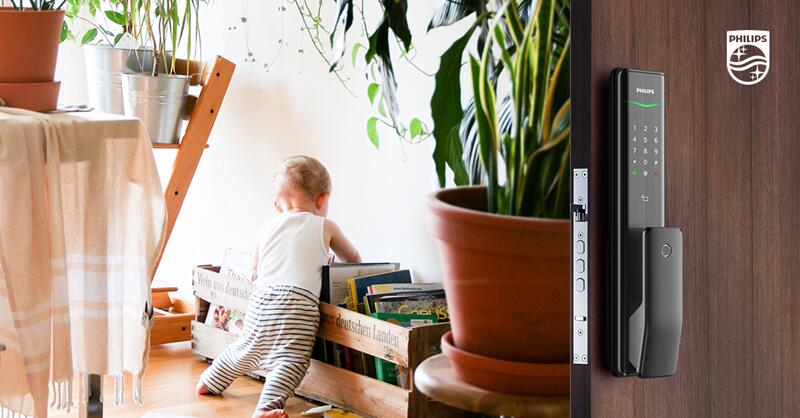
For those needing a better, more hassle-free home security method, smart locks are a fantastic new option. To open or lock the door, smart locks use radio frequency identification (RFID) technology to interact with the user’s smartphone or other devices. These locks are gaining popularity because of the ease and safety they provide.
If you own a smart-locks company and are looking for ways to grow, read on. You should educate yourself well on matters of smart locks. The purpose of the article is to draw attention to the many challenges, both technological and otherwise, that smart locks provide to their users.
Advantages of Smart Locks
There’s a solid reason why smart locks have grown so commonplace in recent years. Homeowners may get more safety, comfort, and adaptability with these cutting-edge gadgets. The Philips smart lock is one of the most modern and well-known solutions for smart locks on the market.
- Increased Safety
Smart locks improve security, which is one of their main benefits. Keyless access and two-factor authentication are only two security features offered by modern smart locks, which are far more complex to pick or breach than conventional locks. In particular, Philips smart locks are equipped with anti-tampering technology and strong encryption to keep the home safe.
- Convenience
Smart locks can provide a great deal of convenience. The days of misplacing keys and forgetting to lock the door are over; with a smart lock, none of these will be an issue. Locking and unlocking the doors is as easy as using a mobile device or a keyless access code from any location. In addition to granting permanent access, the Philips smart lock may provide temporary access to visitors or service technicians.
- Flexibility
When it comes to home safety, smart locks also provide more options. One example is the Philips smart lock, which can be readily connected to other security-related smart home devices like cameras and alarm systems.
The Philips app also allows anyone to check in on the door lock and make adjustments from afar, so users can easily maintain connection and command over their home’s safety no matter where they may be.
Buyers seeking an easy-to-use, trustworthy, and adaptable home security system would do well to consider a Philips smart lock. Homeowners may rest easy knowing their property is secure because of its cutting-edge capabilities and features.
Disadvantages of Smart Locks
Smart locks are cutting-edge gadgets that let people lock and unlock their doors with their phones or by speaking a command. Although they are a safe and practical option, there are a few drawbacks that purchasers should be aware of before investing.
The limitations of smart locks will be explored, with particular attention paid to the Philips Smart Lock as a potential solution for customers.
The fact that they may be easily hacked is one of the biggest problems with smart locks. Like any other technological equipment, smart locks are vulnerable to hacking and may be used by attackers to gain entry to user property.
- Lack of Electricity
Smart locks have the additional drawback of needing constant access to energy. A power failure might render a smart lock inoperable, rendering the door locked.
- Conflicts of Compatibility
Some users may have issues with smart locks since they are only sometimes compatible with their door hardware. If a buyer has previously bought a smart lock and discovers it is incompatible with their door, the experience may be irritating.
- Cost
Some buyers may be put off by the higher initial cost of installing a smart lock.
A Choice for Investment: The Philips Smart Lock

If you’re looking for an alternative to the drawbacks of standard smart locks, the Philips smart lock is a fantastic option. The Philips Smart Lock is hack-proof, works with most door models, and incorporates cutting-edge encryption technology. A battery backup feature keeps the lock operational even if the power goes off.
Furthermore, the smart lock from Philips is also reasonably priced, making it accessible to many customers. In conclusion, the Philips smart lock is an excellent option for anyone who desires a smart lock’s benefits but is concerned about their safety and privacy.
What is Necessary to Use a Smart Lock?
Smart locks’ rising popularity may be attributed to the comfort and safety they provide for homeowners. When it comes to high-tech locks that are also simple to use, the Philips smart lock is a top choice. There are a few necessities for operating a smart lock.
The Philips smart lock communicates with a smartphone or tablet through Bluetooth. Therefore, the user will need a mobile device that’s suitable with the lock’s app, which may be obtained through the app store.
In addition, the smart lock is internet-connected, thus a reliable connection is required for app-based upgrades and remote unlocking. Therefore, a stable Wi-Fi connection or mobile data plan is required.
To utilize smart lock, users will also need to meet these conditions and create an account with the company. Creating a secure password and supplying identifying information such as name, address, and email address will be required. When these conditions are met, the Philips smart lock may provide increased comfort and safety.
How Secure are Smart Locks?
Because of their usefulness and simplicity, smart locks have exploded in popularity in recent years. Access to a residence may be managed remotely using a smartphone or other internet-enabled device. But the issue of safety with smart locks has to be addressed. In this section, we’ll talk about the security features of smart locks and analyze the Philips smart lock in particular.
- Smart Locks Raise Security Concerns
Smart locks’ vulnerability to hacking is a major cause for worry. Smart locks are susceptible to cyber assaults just like any other internet-connected gadget. It’s possible for hackers to bypass the lock’s security measures and open the door without using the key. Another possible problem is that the lock’s battery might expire, thereby locking the owners out of their house.
- Smart Lock Features
Some solutions to these safety issues may be found in the Philips smart lock. An audible alarm will go off if the lock is tampered with and the door is opened. The safety may still be used if the primary battery dies since it contains a backup battery.
The connections between the Philips smart lock and the user’s smartphone or other device are encrypted for additional security. This prevents hackers from intercepting the transmission and decoding it.
Guidelines For Safe Use of Smart Locks
Using smart locks properly is crucial if users care about their safety. Read on for more helpful hints:
- The most foolproof method of preventing unwanted events is to use both a conventional lock and a smart lock simultaneously. If, for any reason, a smart lock stops working, then the old one can still do its job.
- Avoid using key codes in public places where passers-by could pick them up by heart. Users should hide the numeric keypad if they often use it. Alter your program’s code often, too. This is a clever approach to ensure no one learns the code and can enter the residence.
- E-keys should only be shared among close friends and family. Electronic keys (or access codes) that may be sent through an app or text message should generally be utilized only among close relatives.
- If electronic keys are required, ensure that everyone has their own. If something happens to the home while it’s away, the user will have a better idea of who’s responsible.
- Some smart lock applications offer so many neat features. It’s crazy. These additions may keep the place secure and warn customers of unwanted visitors.
- Some mobile applications include the option to predefine a routine for locking and unlocking doors. This may seem helpful initially, but it poses a significant security risk. After all, if the user accidentally activates this while they’re away, a burglar may easily break in.
- This is the most foolproof method for keeping intruders from the smart lock. New app versions may enhance the security system, allowing for more straightforward and thorough home surveillance.
Where Do Smart Locks Shine?
It’s natural to question whether users benefit from installing a smart lock on their front door. These demographics are most likely to find them helpful:
People with Mobility Issues: With a smart lock, users can open and close a door with their phones. Compared to a standard lock, this one is much easier to move about with.
Owners of Airbnbs: Many Airbnb hosts prefer using smart locks because they provide convenient keyless access without duplicate keys. Additional safety is provided by electronic keys that may be easily modified.
Homeowners Using hired Assistance: A smart lock is a good investment if you have a business or other workers come to the house while they’re at work. Users can open the door for them and keep tabs on their comings and goings using smart locks, all while maintaining accountability.
Organizational Owners: Smart locks are often used in workplaces that need an extra layer of security, mainly because of the ease with which door codes can be changed and because a unique code may be assigned to each employee.
When Might Using a Smart Lock Be Risky?
Hearing someone say that smart locks are a terrible idea is unusual. However, if users have a history of misplacing their phone, regularly using potentially dangerous capabilities, or are otherwise technologically inept, they should refrain from doing so.
The Philips Smart Lock Compared to Competitor Smart Locks
Among the most recent smart locks available, the Philips Smart Lock stands out. Compared to other smart locks, it has several benefits, such as:
Simple Setup: The installation process for the Philips Smart Lock is simplified by the fact that it does not need wiring or drilling. The homeowner may easily install the lock in about ten minutes.
Biometric Identifiers: The Philips Smart Lock may be unlocked using a fingerprint reader. Because each person’s fingerprints are unique, this added security measure is very effective.
Cost Effective: The Philips Smart Lock is reasonably priced, so it may be considered by those looking to increase their home security without breaking the bank.
Conclusion
In conclusion, smart locks provide various benefits worth considering before purchasing, such as handy features and increased security for the home or workplace. Philips manufacturer is the best option for investment. Technology failures, hacking, security breaches, and inability to get in because of dead batteries or other system issues are all possible problems. In addition, the upfront and ongoing expenses associated with owning and operating a smart lock might make it more prohibitive than a conventional option.




